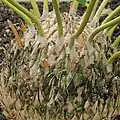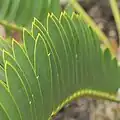| Encephalartos eugene-maraisii | |
|---|---|
 | |
| Scientific classification | |
| Kingdom: | Plantae |
| Clade: | Tracheophytes |
| Clade: | Gymnospermae |
| Division: | Cycadophyta |
| Class: | Cycadopsida |
| Order: | Cycadales |
| Family: | Zamiaceae |
| Genus: | Encephalartos |
| Species: | E. eugene-maraisii |
| Binomial name | |
| Encephalartos eugene-maraisii | |
Encephalartos eugene-maraisii is a species of cycad in the family Zamiaceae. It is endemic to South Africa, where it is limited to Limpopo. It is known as the Waterberg cycad.[1]
This plant grows in the sandstone hills of the Waterberg Range at 1400 to 1500 meters in elevation. The habitat is grassland and savanna. This endangered species is threatened by overcollection.[1]
This species was named for South African naturalist Eugène Marais.[2]
Description
This cycad is tree-like, with a stem up to 2.5 m tall and 30-45 cm wide. Its leaves are bluish or silvery, 100–150 cm long, and have a strong keel. The leaflets are lanceolate, 15–20 cm long, and arranged oppositely along the rachis at a 45–80° angle. They have smooth margins, although the lower leaflets may have a single spine. This species is dioecious, with brown, spindle-shaped male cones that are 20–40 cm long and 6–8 cm wide. Each plant can produce up to three of these cones. The female cones are ovoid, 30–50 cm long, and 16–20 cm in diameter, with each plant producing up to two at a time. The seeds are oblong, 35–40 mm long, and covered with an orange or brown sarcotesta.[3]
 Cone
Cone Trunk
Trunk Leaves
Leaves
See also
References
- 1 2 3 Donaldson, J.S. 2010. Encephalartos eugene-maraisii. The IUCN Red List of Threatened Species. Version 2015.2. Downloaded on 06 September 2015.
- ↑ Gray, S. (2013). Soul-brother Eugène N. Marais: Some notes towards a re-edit of his works. Tydskrif vir letterkunde, 50(2), 62-80.
- ↑ "Encephalartos eugene-maraisii". PlantZAfrica. Retrieved 2024-01-03.
External links
- Encephalartos eugene-maraisii. Tropicos.
 Media related to Encephalartos eugene-maraisii at Wikimedia Commons
Media related to Encephalartos eugene-maraisii at Wikimedia Commons Data related to Encephalartos eugene-maraisii at Wikispecies
Data related to Encephalartos eugene-maraisii at Wikispecies
